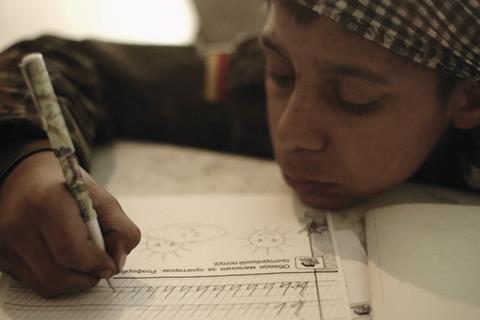Olha Zhurba’s timely debut doc follows a young boy who goes from poster child for the Ukrainian Maiden Uprising to a homeless adult

Dir/scr: Olha Zhurba. Ukraine/Denmark/The Netherlands. 2022. 79 mins.
The first shot of Outside: a laughing child runs through a field of rapeseed plants, his yellow baseball cap the same bold, optimistic hue as the flowers. Above him, a wide blue sky. It is a weighted image. Not because it is a rare moment of joy in the life of street kid Roma, thirteen at the time of this particular piece of footage. But the colours – the blue, the yellow – immediately evoke the flag of Ukraine. It is a flag that has taken on a massive symbolic significance over the past month, one which has become an emblem of the courage of the Ukrainian people; a badge displayed in solidarity around the world. But what of kids like Roma, discarded, unsupported, failed by family and state? In his story – from a thirteen-year-old poster boy for the Maidan Uprising, to a homeless eighteen-year-old rejected by society and targeted by the police – Ukraine shows another face.
The camerawork – edgy, intimate and as shifty and watchful as a criminal – is remarkable, particularly given the level of casual violence in Roma’s world.
The timeliness of this feature debut from Olha Zhurba, which first encounters Roma as a brick-throwing child on the frontlines of violent protests which would lead to the ousting of the pro-Russian President Viktor Yanukovych in 2014, should make it a title of interest on the festival circuit and perhaps with arthouse distributors. However, the chaos of Roma’s life bleeds into the filmmaking. It is not an easy watch, both thematically and in terms of the sometimes jarring editing and the claustrophobic intensity of the camerawork. As such, it might represent something of a marketing challenge theatrically.
The shot of Roma in the field might be the first piece of film footage that is used, but it is not the first thing that we see. That is a black screen – a recurring motif throughout the film – which accompanies audio recordings of conversations between Zhurba and Roma, now eighteen and in prison, serving a sentence for theft. The contrast between the sobering darkness of the present and the wide open promise of the shot that follows, showing Roma as he was five years before, is stark.
Roma’s involvement with the Maidan protests caught the eye of Zhurba and her cinematographer Volodymyr Usyk. And it is not hard to see why. Wearing a jaunty yellow construction worker’s helmet and a makeshift armoured chest piece, he is a diminutive figure, dancing through the mayhem, orchestrating attacks on police vehicles. At night, he sleeps in a tent with much older fighters – it is squalid, but, he later reveals, it seemed preferable at the time to ending up back in the orphanage.
Five years later, Roma is technically an adult. The orphanage, his shelter on and off during the intervening period, will no longer house him. Roma is homeless, his face impassive as the authorities and his distant cousin attempt to shrug off the responsibility for his care. He finds a temporary home with his older brother Kolya, himself recently released from prison. But this, it becomes clear, is not an environment conducive to the rehabilitation of a teenager who has been dabbling with meth and crack since he was eleven and only recently learned how to read. The camerawork – edgy, intimate and as shifty and watchful as a criminal – is remarkable, particularly given the level of casual violence in Roma’s world. Sound design adds to the nervy sensory assault. And Zhurba somehow manages to access surveillance camera footage from Kolya’s town, showing Roma as a perpetual flashpoint for trouble.
Non-linear in approach, the film weaves together shots from earlier times with snapshots of Roma’s more recent travails. And it is this slightly confusing structural decision which is one of the less successful elements of the film, diffusing some of the potency of the grimly powerful footage.
Production company: Moon Man
International sales: Deckert distribution info@deckert-distribution.com
Producers: Darya Bassel, Vika Khomenko
Cinematography: Volodymyr Usyk
Editing: Olha Zhurba
Music: Cédric Elisabeth, Yaroslav Tatarchenko






![The Brightest SunScreen[Courtesy HKIFF]](https://d1nslcd7m2225b.cloudfront.net/Pictures/274x183/3/5/0/1448350_thebrightestsunscreencourtesyhkiff_312678.jpg)















![The Brightest SunScreen[Courtesy HKIFF]](https://d1nslcd7m2225b.cloudfront.net/Pictures/100x67/3/5/0/1448350_thebrightestsunscreencourtesyhkiff_312678.jpg)

